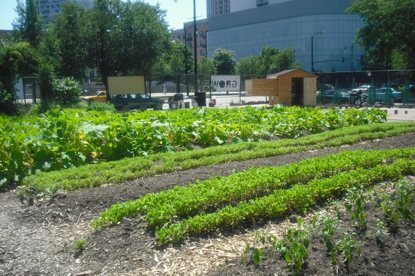The Chicago Lights Urban Farm in the Cabrini-Green neighborhood, a garden run in collaboration with Growing Power Inc. (Image via ChicagoLights.org.)
By Judith NemesUrban farming entrepreneurs can start digging and planting now that Chicago’s City Council passed a new zoning ordinance that defines what they can do on a parcel of land within the city limits.
Earlier this month, the City Council passed an amendment to the zoning code that recognizes urban agriculture and allows individuals or organizations to apply for building permits and zoning approvals to get those enterprises underway. The ordinance legalizes urban farming of vegetables, fruits and fish and enables owners to sell what they raise on those premises.
Urban agriculture advocates prodded Mayor Richard Daley for years to eliminate some of the bureaucratic hurdles so anyone interested in cultivating vacant city lots would have simpler guidelines on how to proceed. And while a growing number of city farms and community gardens were sprouting around the city anyway, owners had to jump through many hoops before they could get started. Change came earlier this year when newly-elected Mayor Rahm Emanuel declared urban farming was a priority and vowed to push through a zoning ordinance to offer more straightforward guidelines.
Local urban farming activists generally praise the new ordinance. They say urban agriculture enterprises can be financially successful and beneficial to disadvantaged communities with fewer healthy food choices and little economic opportunity.
Erika Allen
Erika Allen is among that group. She’s national projects manager and head of the Chicago operation of Growing Power Inc., a non-profit based in Milwaukee started by Will Allen (her dad) that’s nationally noted for its work in urban farming. Growing Power was established in 1993, long before the movement gained popularity among green activists or city chefs eager to cook with locally-sourced ingredients. Growing Power offers training programs for people looking to operate city farms as a business.
Ms. Allen has been a critic of the former mayor’s urban agriculture policy. Crain’s met up with her this week to talk about the growth potential for entrepreneurs in this sector of the local green economy.
Crain’s: Why is this new ordinance getting rave reviews from the urban farming community?
Ms. Allen: It legitimizes urban agriculture as an enterprise or a business that hasn’t been on the books before. Chicago always had farms within the city limits, but the new ordinance creates a space where we can begin to create economic opportunities within our communities, especially in areas where food deserts are a direct result of unemployment and little economic opportunity.
These policies are needed so we can legally operate urban farms and community gardens with parameters around where they can and can’t be located. I’ve been in a leadership role in The Chicago Food Policy Advisory Council since 2001 and I can tell you that you don’t know there are barriers to urban farming unless you’re trying to operate a business where there’s a need in the community.
(Former) Mayor Daley’s administration was focused on greening the city, but there was a lot of bureaucracy and artificial barriers around urban farming. The new administration has a comprehensive understanding of urban agriculture and they aren’t putting it in one silo. They see that it’s an opportunity to train youth, create economic development, and create tax revenue for the city. Urban farming also creates safer communities because people are out working in their neighborhoods; it provides food locally; and owners hire people within those communities.
Crain’s: Will this new ordinance create a more favorable climate for Chicago entrepreneurs to give urban ag a shot?
Ms. Allen: Yes. This new administration is so committed to addressing food desert issues. But they also see there’s revenue opportunity for the city. As soon as you open a for-profit business, there’s tax revenue that can be garnered. Lots of people will see that urban farming can be a very powerful economic engine.
At our Milwaukee headquarters, our training program for people who want to do this as a business has grown tremendously. Two years ago we had 12 people in the program and this past year we had 53, with people coming from coast to coast. In another program, we’ve been training about 200 people a month (from June to January) just to learn how to farm.The goal of all these different layers of programming is to create a movement.
Crain’s: Can urban farming run as a profitable business or is it more about social enterprise?
Ms. Allen: It can absolutely be profitable. To do that, it needs to be diversified — there has to be enough production of different things so the business is reliable. We believe the best way to operate is to grow produce, raise honey from bees, produce compost and do other things. Your cash flow streams will be incredibly diverse that way and more sustainable. Then you can take it to the next level and provide other services that are built upon those activities.
Crain’s: What are the financing options for anyone interested in pursuing urban farming in Chicago?
Ms. Allen: There needs to be better options, but there are some out there. Whole Foods has a revolving loan fund to support local growers and there’s also Farm Service Agency (FSA) loans (from the U.S. Department of Agriculture). CSAs (community supported agriculture) are important too because they give farmers the money when they need it. People buy shares in the farm and they get the dividends in the form of produce when it’s harvested. Those have worked really well. Real farmers want to be successful and not have lots of loans.
We also just got a $1 million national grant from Walmart for site development and a revolving loan program for people who go through our urban agriculture program.
I hope people on the sidelines waiting to support investment in these new businesses will now jump in. There’s a better opportunity now for profit, so those folks should be encouraged by the new atmosphere we’re in.
Crain’s: Can urban farming create new jobs in the local green economy?
Ms. Allen: Yes. You can have someone in a warehouse doing urban farming employing only one person running a hydroponic system. But at our Iron Street farm, for example, we have 15 full-time and 15 part-time and we’ve barely starting growing there. There isn’t a lot of growth in the traditional job sector, but people engaged here can have a direct connection with the marketplace and that’s really attractive to a lot of people now.
Crain’s: What’s the next step to paving the way for better city and state laws that can encourage more growth in this sector of the green economy?
Ms. Allen: Mayor Emanuel followed through on his promise to make this zoning ordinance happen. Our next big hurdle is getting composting laws in order. We’re way behind many other cities on that. We have a meeting next week with urban agriculture practitioners and city officials to figure out what to do next. The we’ll go to the state level to try to get some changes made since composting laws have to change at that level first. I’m told the city’s on board with making composting laws more favorable for urban farmers.



